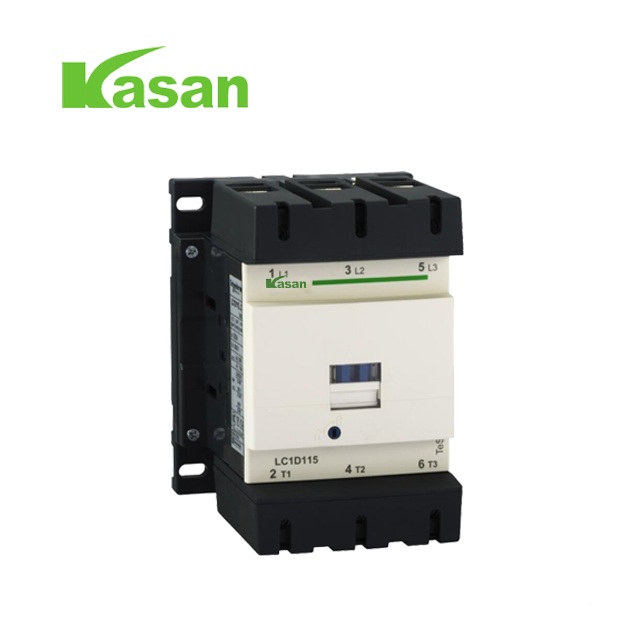- English
- Español
- Português
- русский
- Français
- 日本語
- Deutsch
- tiếng Việt
- Italiano
- Nederlands
- ภาษาไทย
- Polski
- 한국어
- Svenska
- magyar
- Malay
- বাংলা ভাষার
- Dansk
- Suomi
- हिन्दी
- Pilipino
- Türkçe
- Gaeilge
- العربية
- Indonesia
- Norsk
- تمل
- český
- ελληνικά
- український
- Javanese
- فارسی
- தமிழ்
- తెలుగు
- नेपाली
- Burmese
- български
- ລາວ
- Latine
- Қазақша
- Euskal
- Azərbaycan
- Slovenský jazyk
- Македонски
- Lietuvos
- Eesti Keel
- Română
- Slovenski
- मराठी
- Srpski језик
How Does an AC Contactor Enhance Electrical Systems Efficiency?
AC contactors are critical components in modern electrical systems, designed to control high-power circuits using low-power signals. These devices are widely employed in industrial, commercial, and residential applications to manage motors, lighting systems, and heating equipment safely and efficiently. The central purpose of this article is to provide a comprehensive understanding of AC contactors, their functions, advantages, operational principles, and future trends in electrical automation.
What Is an AC Contactor and How Does It Work?
An AC contactor is an electrically controlled switch used for switching an AC power circuit. The device consists of a coil, a set of contacts, and an enclosure. When an electrical current flows through the coil, it generates a magnetic field that pulls the contacts together, allowing current to flow through the main circuit. When the coil is de-energized, a spring mechanism returns the contacts to their original position, interrupting the power flow.
The primary advantage of AC contactors over conventional switches is their ability to handle high-voltage and high-current loads without the risk of manual operation hazards. They also allow for remote control of electrical devices, which enhances operational efficiency and safety in automated systems.
Key Components of an AC Contactor
| Component | Function |
|---|---|
| Coil | Generates a magnetic field to move the contacts |
| Main Contacts | Allow current flow when engaged, designed for high current applications |
| Auxiliary Contacts | Used for signaling or control functions in auxiliary circuits |
| Enclosure | Protects internal components from dust, moisture, and mechanical damage |
| Spring Mechanism | Returns contacts to the default position when the coil is de-energized |
How Does the Coil Voltage Influence AC Contactor Operation?
The coil voltage determines the control signal required to actuate the contactor. Using the correct voltage ensures reliable switching and prevents premature coil burnout. For instance, a 220V AC coil must be energized with the correct rated voltage; deviations can cause operational failures or reduced lifespan.
Why Are AC Contactors Preferred in Industrial Applications?
AC contactors are favored in industrial environments for several reasons:
-
High Load Handling: They can switch large currents safely without the need for manual intervention.
-
Remote Operation: Integration with PLCs or automation systems allows centralized control.
-
Durability: Designed for frequent switching, contactors withstand mechanical and electrical stress over thousands of cycles.
-
Safety: Eliminates the hazards of manual switching for high-power circuits.
By understanding these fundamental principles, users can select the appropriate AC contactor based on application needs, coil voltage, current rating, and mechanical endurance.
Why Should Businesses Invest in Advanced AC Contactors?
Industrial automation continues to evolve, and AC contactors play a vital role in this transformation. Businesses increasingly demand reliable electrical components that reduce downtime, enhance safety, and extend equipment longevity. Investing in advanced AC contactors contributes to operational efficiency and cost reduction.
What Are the Core Advantages of AC Contactors?
-
Energy Efficiency: Modern contactors reduce electrical losses and enhance overall system performance.
-
Longevity and Reliability: High-quality contactors, such as those built with durable silver alloy contacts, resist wear and oxidation.
-
Versatility: Suitable for various electrical loads, including motors, heaters, and lighting circuits.
-
Low Maintenance: Minimal mechanical components reduce maintenance frequency and operational costs.
How Do AC Contactors Integrate with Automation Systems?
AC contactors are integral to industrial automation setups. They can be controlled by PLCs (Programmable Logic Controllers) or other digital control systems, enabling precise timing, remote monitoring, and automated switching. This integration allows businesses to optimize production lines, reduce manual labor, and enhance operational safety.
What Future Trends Are Shaping AC Contactor Development?
The demand for energy-efficient, compact, and intelligent electrical components is driving innovation in AC contactor design. Key trends include:
-
Miniaturization: Smaller, more compact designs to fit tight control panels without sacrificing performance.
-
Smart Monitoring: Contactors with integrated sensors for real-time monitoring of coil status, contact wear, and load current.
-
Eco-Friendly Materials: Use of recyclable components and reduced hazardous substances to comply with environmental regulations.
-
Enhanced Durability: Development of contacts resistant to high inrush currents and mechanical wear for extended lifecycle.
These trends demonstrate that AC contactors are evolving beyond simple switches into intelligent devices that enhance the efficiency and safety of modern electrical systems.
How Can AC Contactors Optimize Performance in Complex Systems?
Selecting the right AC contactor is critical for system optimization. Performance depends on accurate specification matching, correct installation, and regular maintenance.
Key Parameters to Consider
| Parameter | Description |
|---|---|
| Rated Operational Voltage | Maximum voltage the contactor can handle continuously |
| Rated Operational Current | Maximum current the contactor can safely carry |
| Coil Voltage | Voltage required to energize the coil |
| Mechanical Endurance | Number of operating cycles the contactor can perform without failure |
| Electrical Endurance | Number of electrical operations at full load the contactor can handle |
| Number of Poles | Single-pole or multi-pole configuration for specific applications |
| Auxiliary Contacts | Normally open or normally closed contacts for signaling or control functions |
Why Is Correct Installation Critical?
Improper installation can lead to overheating, coil failure, and reduced contactor lifespan. Ensuring proper wire sizing, secure connections, and adequate spacing prevents electrical faults and operational inefficiencies.
How Does Maintenance Influence Longevity?
Routine inspections, such as checking contact wear, coil integrity, and terminal tightness, significantly extend service life. Neglecting maintenance can result in operational failures, system downtime, and costly repairs.
Common Questions About AC Contactors
Q1: How can I determine the right AC contactor for my motor?
A1: Consider the motor's voltage, current rating, and starting characteristics. Ensure the contactor’s rated operational current exceeds the motor’s full-load current, and verify the coil voltage matches your control circuit.
Q2: Why does an AC contactor sometimes fail to close?
A2: Common causes include insufficient coil voltage, mechanical obstruction, worn contacts, or a faulty spring. Inspecting and testing the coil and contacts usually resolves the issue.
Q3: How often should AC contactors be inspected or replaced?
A3: Industrial contactors should be inspected every 6–12 months, depending on usage frequency. Contact replacement is recommended if wear, pitting, or resistance increases beyond manufacturer specifications.
What Makes Wenzhou Kasan AC Contactors a Reliable Choice?
Wenzhou Kasan AC contactors combine durability, safety, and high efficiency, making them a trusted choice for industrial and commercial applications. Their products adhere to international quality standards and offer robust performance under demanding conditions. Kasan contactors are designed for easy integration into automated systems, providing long-term operational reliability.
By choosing Wenzhou Kasan, businesses benefit from:
-
Consistent performance under high electrical loads
-
Low maintenance requirements
-
Compatibility with modern industrial automation systems
-
Comprehensive technical support and consultation
For inquiries about product specifications, pricing, or technical support, Contact Us to connect with Wenzhou Kasan specialists and ensure the optimal selection of AC contactors for your applications.





